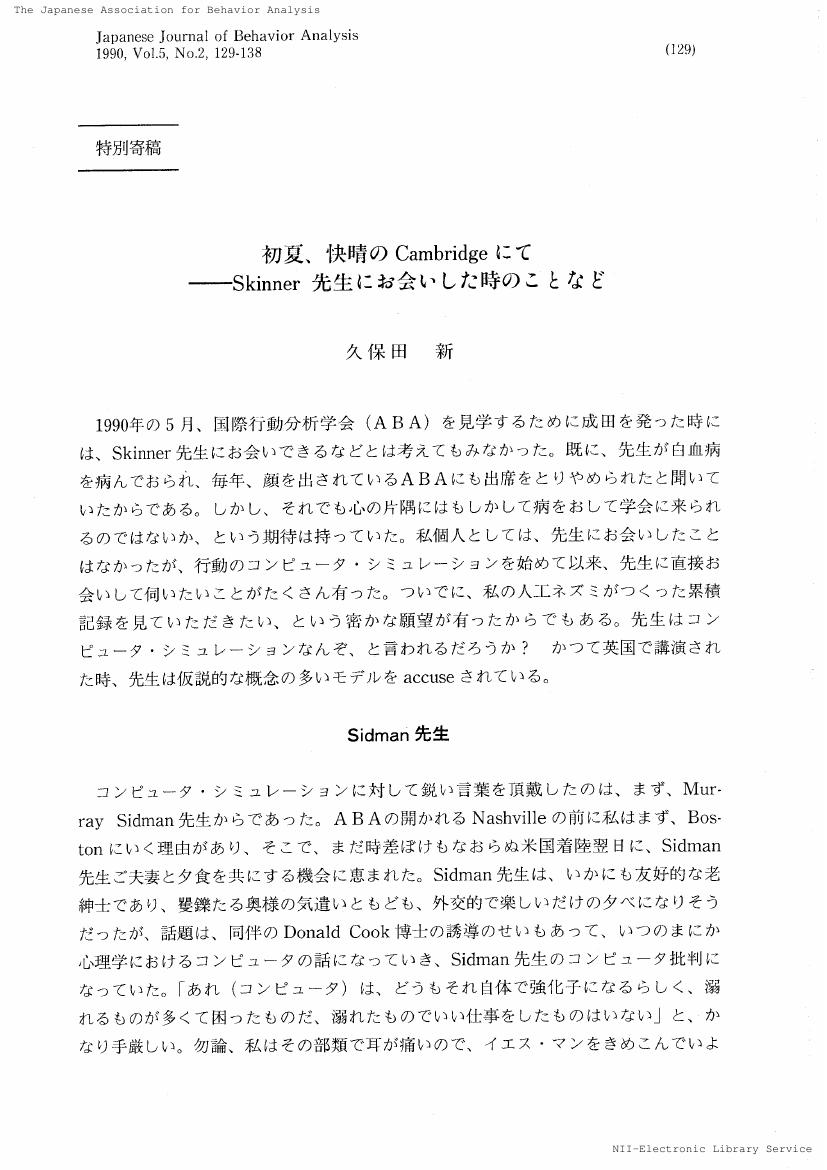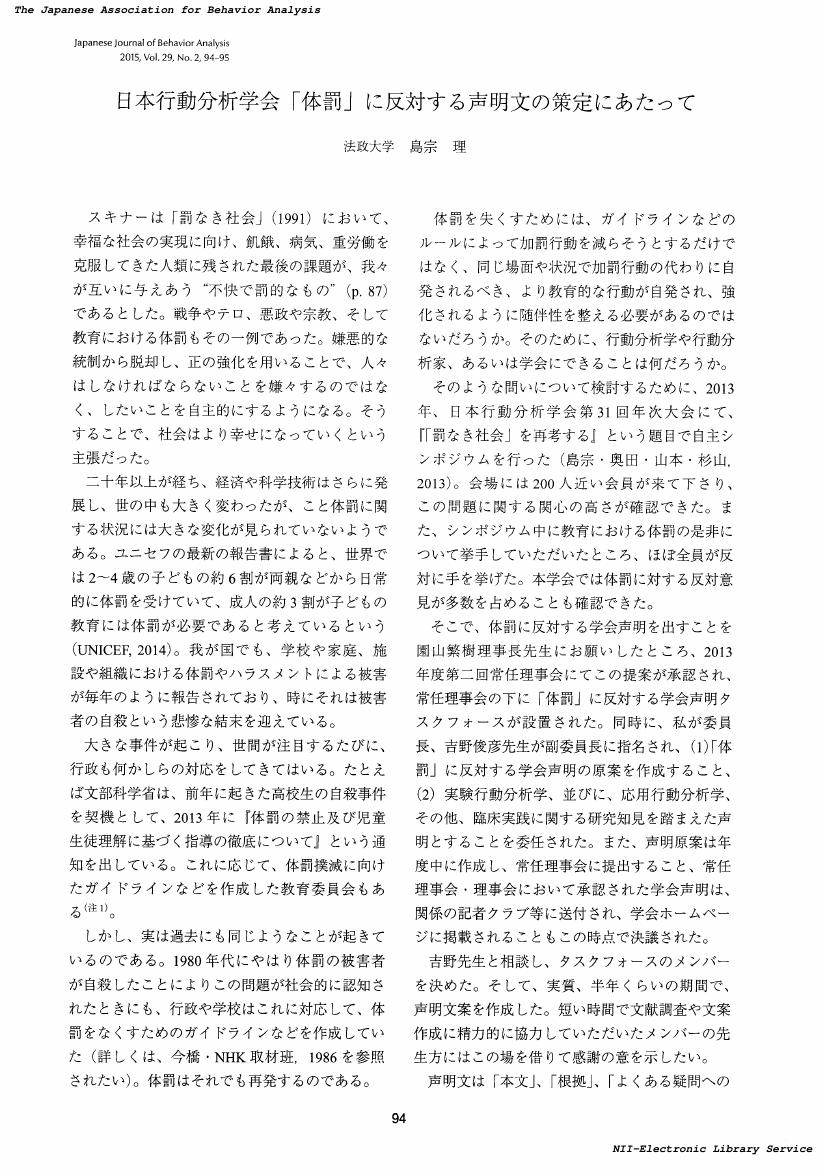12 0 0 0 OA 行動的テクノロジーの普及に関する研究と実践の提言(<特集>スキナーを21世紀に活かす)
- 著者
- 島宗 理
- 出版者
- 一般社団法人 日本行動分析学会
- 雑誌
- 行動分析学研究 (ISSN:09138013)
- 巻号頁・発行日
- vol.10, no.1, pp.46-57, 1996-08-05 (Released:2017-06-28)
どんなテクノロジーでもそれが活用されるためには、まず採用されなければならない。スキナーは行動分析学の基本的枠組みと、それを社会問題の解決に役立てるための指針を示した。これを21世紀に活かすためには、テクノロジー普及に関する研究と実践が欠かせない。本論文では普及に成功した行動的プログラムの例と失敗した例を分析し、普及に関する実験的・理論的研究と、さらなる実践についての提言を行う。
- 著者
- 奥田 健次
- 出版者
- 一般社団法人 日本行動分析学会
- 雑誌
- 行動分析学研究 (ISSN:09138013)
- 巻号頁・発行日
- vol.20, no.1, pp.2-12, 2006-08-31 (Released:2017-06-28)
- 被引用文献数
- 5
研究の目的:高機能広汎性発達障害をもつ不登校児童の保護者に対して登校行動を形成するための行動コンサルテーションによるサービスの効果を検討した。研究計画:被験者間マルチプルベースラインデザインと基準変更デザインの組み合わせを用いた。場面:大学附属の心理相談室とプレイルームにて実施した。対象者:2名の高機能広汎性発達障害をもつ不登校児童とその保護者を対象とした。介入:それぞれの不登校児童について直接的な行動観察と、保護者や学校からの聞き取りによる生態学的アセスメントに基づいて、トークン・エコノミー法と強化基準を段階的に変更していく支援を実施した。行動の指標:登校から下校までの学校活動への参加を、学校参加率として測定した。結果:介入後、両名とも学校参加率が増加し、介入2以降、100%の学校参加率が続いた。結論:トークン・エコノミー法を利用した行動コンサルテーションによる支援において、対象児童や対象児童の母親、学校場面の生態学的アセスメントに基づく支援プログラムの作成と実施が重要であることが示された。
12 0 0 0 OA シングルケースデザインの概要(記念シンポジウム)
- 著者
- 石井 拓
- 出版者
- 一般社団法人 日本行動分析学会
- 雑誌
- 行動分析学研究 (ISSN:09138013)
- 巻号頁・発行日
- vol.29, no.Suppl, pp.188-199, 2015-03-31 (Released:2017-06-28)
- 被引用文献数
- 4
まず、シングルケース実験デザインの基本的な特徴や、その基本的な種類である反転デザイン、基準変更デザイン、多層ベースラインデザイン、処遇交替デザインを紹介した。次に、それらのデザインを用いて得られた実験結果がエビデンスとしていかなる資格をもつかを検討するために、研究の内的妥当性と外的妥当性の問題をどのように取扱うかを解説した。それらの取扱いを群間比較法の場合と比較すると、シングルケースデザインでは実験参加者の選択やその選択と処遇の交絡の影響、および処遇間の干渉に伴う各種の影響を外的妥当性の問題として反復実験で検討しなくてはならないことを指摘した。さらに、反復実験を通してある実験結果のエビデンスを強めていく方略に、現状では問題があることも指摘した。それらの問題に対処するために、今後はシングルケースデザインを用いた複数の研究結果を効率よくまとめることを可能にするようなガイドラインの整備や、実践に基づいた研究ネットワークの仕組みを活用できる可能性を提案した。
12 0 0 0 自覚せざる仏教徒としてのスキナー : 随伴性とは縁である
- 著者
- 佐藤 方哉
- 出版者
- 一般社団法人 日本行動分析学会
- 雑誌
- 行動分析学研究
- 巻号頁・発行日
- vol.5, no.2, 1991
- 被引用文献数
- 1
11 0 0 0 OA 自覚せざる仏教徒としてのスキナー : 随伴性とは縁である
- 著者
- 佐藤 方哉
- 出版者
- 一般社団法人 日本行動分析学会
- 雑誌
- 行動分析学研究 (ISSN:09138013)
- 巻号頁・発行日
- vol.5, no.2, pp.107, 1991-03-31 (Released:2017-06-28)
- 著者
- 武藤 崇
- 出版者
- 一般社団法人 日本行動分析学会
- 雑誌
- 行動分析学研究 (ISSN:09138013)
- 巻号頁・発行日
- vol.15, no.2, pp.67-72, 2001-06-30 (Released:2017-06-28)
10 0 0 0 OA 単一事例実験データの分析方法としてのランダマイゼーション検定
- 著者
- 山田 剛史
- 出版者
- 一般社団法人 日本行動分析学会
- 雑誌
- 行動分析学研究 (ISSN:09138013)
- 巻号頁・発行日
- vol.13, no.1, pp.44-58, 1999-02-25 (Released:2017-06-28)
単一事例実1験計画(シングルケース研究法)で得られたデータの評価方法として、いくつがの統計的方法が提案されている。ランダマイゼーション検定は、(1) データの系列依存性を問題としない、(2) 時系列分析ほど多くのデータポイン1・を必要としない、(3) 様々なデザインに適した方法が考案されている、といった理由からシングルケースデータの分析方法として近年注目されてきている。本稿では、これまで多くの研究者によって提案されてきた、様々な単一事例実験データ分析のためのランダマイゼーション検定の方法を、(1) 測定時期への処理のランダム振り分け、(2) 介入ポイントのランダム振り分け、(3) フェーズへの処理のランダム振り分け、とランダム振り分けの方法の違いにより大別し、さらにそのカテゴリ下に分類される種々のランダマイゼーション検定の方法について概説するとともに、この検定を実際のデータに適用する際の問題点に関しての検討を行う。
10 0 0 0 OA 知的障害者入所施設における応用行動分析の広範な使用 : 組織行動マネジメントについての臨床的研究
- 著者
- 内田 一成
- 出版者
- 一般社団法人 日本行動分析学会
- 雑誌
- 行動分析学研究 (ISSN:09138013)
- 巻号頁・発行日
- vol.19, no.2, pp.124-136, 2005-04-30 (Released:2017-06-28)
本論文の目的は、1知的障害者入所施設に導入した、職員のニーズ関連行動の増加とニーズ解決技能の習熟ならびにそれらの組織的結果を強化する6つの行動パッケージからなる、組織的援助システムについての臨床実験の成績を報告し、今後の入所施設サービスについての方法論的枠組みと応用行動分析の役割について議論することである。3ヵ年にわたる研究結果は、この組織的援助システムが施設の専門的援助機能を有意に高め、知的障害や発達障害を有する入所者の適応行動と不適応行動に劇的な改善をもたらすことを示していた。本知見は、この新たなシステムが施設サービスにおいて知的障害や発達障害をもつ人々に最適なQOLを提供するうえで本質的な役割を演じるとともに、地域社会に根ざしたサービスや他の対人援助場面でも適用可能であることを示唆している。
- 著者
- 高畑 庄蔵 武蔵 博文
- 出版者
- 一般社団法人 日本行動分析学会
- 雑誌
- 行動分析学研究 (ISSN:09138013)
- 巻号頁・発行日
- vol.13, no.1, pp.2-16, 1999-02-25 (Released:2017-06-28)
本研究の目的は、地域で生活する肥満の知的障害者を対象として、8か月にわたる食生活・運動プログラムを実施し、障害者本人力川常場面において適度な食生活・運動習慣の形成を長期的に維持することである。日常場面での標的行動の自発を促進するための支援システムとして次の二つを導入した。"生活技能支援ツール"は、障害者本人が現有する能力を発揮して標的スキルの習得や実施を容易にする手がかりとなるものと、自己の行動を記録管理して障害者本人と保護者とが評価し合う機会を提供するものとで構成される。"地域生活支援教室"は、標的行動が定着するまでの定期的支援を行うものである。結果、対象者8名のうち4名について標的行動の実施が確認され、約2kgから5kgの体重の減少と指導終了1年3か月後のフォローアップでも体重の維持が確認された。また、プログラム消費者となり得る人々の社会的妥当性でも肯定的な評価を得た。日常場面での標的行動の自発・長期的な維持の方略、家庭への支援システムの観点から考察がなされた。
9 0 0 0 OA 言語の探究 : 科学的行動の科学として行動分析学
- 著者
- 山本 淳一
- 出版者
- 一般社団法人 日本行動分析学会
- 雑誌
- 行動分析学研究 (ISSN:09138013)
- 巻号頁・発行日
- vol.26, no.1, pp.40-45, 2011-07-25 (Released:2017-06-28)
8 0 0 0 OA 行動上の問題に対する行動記録アプリケーション“Observations”の開発
- 著者
- 井上 雅彦 中谷 啓太 東野 正幸
- 出版者
- 一般社団法人 日本行動分析学会
- 雑誌
- 行動分析学研究 (ISSN:09138013)
- 巻号頁・発行日
- vol.34, no.1, pp.78-86, 2019-08-31 (Released:2020-08-31)
- 参考文献数
- 11
自閉症や知的障害のある人々の問題行動に関する機能分析的アプローチは多くの研究でそのエビデンスが示されている。近年これらの治療研究は、家庭、学校、施設などコミュニティで実施されるものが増加しており、非専門家による行動記録の収集と評価が課題となっている。本研究の目的は、日常場面において非専門家が行う行動記録を援助するアプリケーションを開発することであった。本アプリケーションは、Android(アンドロイド機器用)とiOS(iPhone, iPad用)の2つのOS版を各OSの配布サイトからダウンロードし、スマートフォンやタブレットなどのデバイスで利用可能である。記録者は観察時間や標的行動などを設定し、行動の出現に合わせてカテゴリーをタップすることで記録される。入力された行動観察データは即時にグラフ化して表示させることが可能である。データは各デバイス内に格納蓄積され、必要に応じてcsv形式でメール送信可能なため、パソコンなどでのデータの編集加工が可能となっている。家庭と事業所での試用から、本アプリケーションの有効性と課題について考察した。
8 0 0 0 OA 初夏、快晴のCambridgeにて : Skinner先生にお会いした時のことなど
- 著者
- 久保田 新
- 出版者
- 一般社団法人 日本行動分析学会
- 雑誌
- 行動分析学研究 (ISSN:09138013)
- 巻号頁・発行日
- vol.5, no.2, pp.129-138, 1991-03-31 (Released:2017-06-28)
- 著者
- 松山 康成 沖原 総太 田中 善大
- 出版者
- 一般社団法人 日本行動分析学会
- 雑誌
- 行動分析学研究 (ISSN:09138013)
- 巻号頁・発行日
- vol.36, no.2, pp.139-148, 2022-03-18 (Released:2023-03-18)
- 参考文献数
- 8
研究の目的 本研究では、授業開始時に授業準備行動を行う児童が少ない小学4年生の通常の学級に対して、授業開始時の授業準備行動(話の聞き方と準備物の用意)を対象として、集団随伴性を含む介入パッケージを実施し、その効果を検討した。研究計画 ABCDデザインを用いた。ベースライン期(A条件)に続いて、3つの介入(B条件、C条件、D条件)を実施した。場面 公立小学校通常の学級の授業開始時に介入を行った。対象者 公立小学校4年生1学級の31名(男児16名、女児15名)の児童であった。介入 B条件では話の聞き方の授業とステキな聞き方のルールの掲示を、C条件ではB条件に加えて準備物の授業と集団随伴性の手続き(「グーチャレンジ」),さらに担任の対応を、D条件ではC条件に加えてタイマーの表示を実施した。行動の指標 授業準備行動の指標として授業開始時の静かになるまでの時間を連続記録法によって、授業開始時の準備物の用意を産物記録法によって測定した。結果 静かになるまでの時間はB条件及びD条件の実施によって減少し、準備物の用意はC条件の実施によって増加した。結論 授業開始時の授業準備行動に対する集団随伴性を含む介入パッケージの効果が示された。
7 0 0 0 OA 学校規模ポジティブ行動支援(SWPBS)を支えるデータシステムとしてのODR
- 著者
- 田中 善大
- 出版者
- 一般社団法人 日本行動分析学会
- 雑誌
- 行動分析学研究 (ISSN:09138013)
- 巻号頁・発行日
- vol.34, no.2, pp.211-228, 2020-03-20 (Released:2021-03-20)
- 参考文献数
- 47
- 被引用文献数
- 7
管理職への規律指導に関する照会(Office Discipline Referral: ODR)は、学校規模ポジティブ行動支援(SWPBS)を支えるデータシステムとして、米国の多くの学校で活用されている。ODRは、問題行動を管理、監督するための方法として、米国の学校で一般的に実施されている手続きであるが、日本ではほとんど馴染みがない。本論文では、SWPBSの実践を支えるデータシステムとしてのODRの特徴とODRのデータを活用したデータに基づく意思決定について解説する。解説に続いて、SWPBSに関連するODRの研究をレビューする。ここでは、ODRデータに基づく意思決定、SWPBSの効果指標としての活用、ODRデータの妥当性及び信頼性に関する研究をレビューする。ODRデータの研究をレビューした後、SWPBSにおけるODRデータの刺激機能について分析する。最後に、日本におけるSWPBSを支えるデータシステムについて考察する。
- 著者
- 庭山 和貴
- 出版者
- 一般社団法人 日本行動分析学会
- 雑誌
- 行動分析学研究 (ISSN:09138013)
- 巻号頁・発行日
- vol.34, no.2, pp.178-197, 2020-03-20 (Released:2021-03-20)
- 参考文献数
- 74
- 被引用文献数
- 10
学校規模ポジティブ行動支援(SWPBS)は、教育システムに対して行動分析学的アプローチを適用したものである。SWPBSには、大きく分けて「実践」、「システム」、「データ」、「成果」という4つの構成要素があるが、これまでこれら4つの構成要素を三項随伴性の枠組みで整理することはほとんどなされていない。これを整理することは、今後、日本におけるSWPBSがどうあるべきかを考える上で必要だと考えられる。さらに、SWPBSは学校内だけで成立するものではなく、その導入・実行・持続を支える法・州・学区からのサポートが米国では存在する。そこで本稿では、SWPBSの構成要素を三項随伴性の枠組みで整理した上で、米国における26,000校以上のSWPBSの実践を支えるシステムについて検討した。これらの検討を踏まえた上で、日本における今後のSWPBSの研究・普及の課題として、「データに基づく意思決定システム」の開発が必要であること、また教職員のSWPBSの実行をサポートするために、これまでの通常業務の代替行動としてSWPBS関連行動を捉えていくことの重要性を指摘した。
6 0 0 0 OA シングルケースデザインの現状と展望(記念シンポジウム)
- 著者
- 井垣 竹晴
- 出版者
- 一般社団法人 日本行動分析学会
- 雑誌
- 行動分析学研究 (ISSN:09138013)
- 巻号頁・発行日
- vol.29, no.Suppl, pp.174-187, 2015-03-31 (Released:2017-06-28)
- 被引用文献数
- 1
シングルケースデザイン(Single-Case Designs: SCD)は、少数個体のデータをもとに独立変数と従属変数間の因果関係の検討を行う実験法のひとつである。SCDを利用した研究において、個々の行動は、独立変数のある場合とない場合の両方において繰り返し測定される。SCDは、群間比較法(つまりランダム化比較試験)に比べ、迅速にまた柔軟に独立変数の操作を行うことができるという重要な利点を持つ。しかしながら現在の実験心理学研究においては、群間比較法が、因果関係を検討するゴールデン・スタンダードとみなされ、SCDは実験法として正当な評価を受けているとは必ずしも言えない。しかし近年、国外ではSCDに関する関心がさまざまな領域で高まりつつある。本論文では、SCDの歴史や国内外の現状について述べ、SCDの普及や発展のために必要とされる諸点についての展望をレビューする。併せてエビデンスに基づく実践の運動や、SCDの基準作成についての研究にも触れる。
6 0 0 0 OA ベアー先生に捧ぐ(追悼 : ドナルド・M・ベアー(1931-2002))
- 著者
- 出口 光
- 出版者
- 一般社団法人 日本行動分析学会
- 雑誌
- 行動分析学研究 (ISSN:09138013)
- 巻号頁・発行日
- vol.17, no.1, pp.65, 2003-04-20 (Released:2017-06-28)
6 0 0 0 OA 刺激等価性 : 言語機能・認知機能の行動分析
- 著者
- 山本 淳一
- 出版者
- 一般社団法人 日本行動分析学会
- 雑誌
- 行動分析学研究 (ISSN:09138013)
- 巻号頁・発行日
- vol.7, no.1, pp.1-39, 1994-12-25 (Released:2017-06-28)
- 被引用文献数
- 2
Stimulus equivalence has been used as a framework for analyzing linguistic and cognitive functions of human behavior. In this paper, I review recent research on stimulus equivalence. First, I describe how linguistic and cognitive functions may be explained as stimulus-stimulus relationships from the perspective of behavior analysis, and how conditional discrimination can produce derived stimulus relationships, such as stimulus equivalence. Various aspects of linguistic function, such as semantics, syntactics, pragmatics, and a variety of verbal response repertoires, have been analyzed using the stimulus equivalence paradigm. Stimulus equivalence analysis has also been applied to the sutudy of cognitive function, such as concept formation, the hierarchical structure of meaning, and inference. Recent issues in research on nonhumans, the effects of the naming response, and methodological problems are also discussed. Finally, higher-ordered conditional discrimination and relational frames are examined in terms of expansion of the theory and applicability of the paradigm.
6 0 0 0 OA 日本行動分析学会「体罰」に反対する声明文の策定にあたって
- 著者
- 島宗 理
- 出版者
- 一般社団法人 日本行動分析学会
- 雑誌
- 行動分析学研究 (ISSN:09138013)
- 巻号頁・発行日
- vol.29, no.2, pp.94-95, 2015-02-25 (Released:2017-06-28)
- 著者
- 松山 康成 三田地 真実
- 出版者
- 一般社団法人 日本行動分析学会
- 雑誌
- 行動分析学研究 (ISSN:09138013)
- 巻号頁・発行日
- vol.34, no.2, pp.258-273, 2020-03-20 (Released:2021-03-20)
- 参考文献数
- 25
研究の目的 本研究の目的は、高等学校における学校規模ポジティブ行動支援(School-Wide Positive Behavior Support)の特に第1層支援の効果について検討することである。研究計画 ABCBCDEデザインが用いられた。場面 公立の高等学校において実施された。参加者 高等学校の在校生734名、教員54名であった。介入 学校における目標行動を生徒と教員にリマインドするためのポジティブ行動マトリクスを作成し校内に掲示した。それに加えて目標行動を実行した生徒へのフィードバックを与えるために、GBT (Good Behavior Ticket)およびPPR (Positive Peer Reporting)の両手続きを導入した。前者は、教員によって提示され、後者は生徒によって提示された。行動の指標 問題行動を示した生徒への懲戒件数および目標行動が生起した数を得るためにGBTカードとPPRカードの数を用いた。結果 SWPBS第1層支援(ポジティブ行動マトリクスの掲示、GBTおよびPPR手続きの導入)により、懲戒件数は減少することが示された。結論 SWPBSにおける第1層支援の介入として、ポジティブ行動マトリクスの掲示とGBTおよびPPRの手続きの適用が有効であることが示された。しかし、今回の第1層支援の方略だけでは、問題行動を示す生徒が残されていたため、第2層支援、第3層支援に位置づけられるようなより高密度で個別的な介入が必要であると考えられた。





